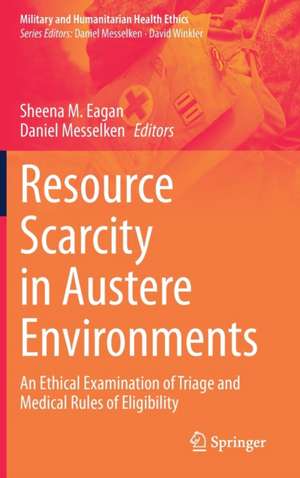Resource Scarcity in Austere Environments: An Ethical Examination of Triage and Medical Rules of Eligibility: Military and Humanitarian Health Ethics
Editat de Sheena M. Eagan, Daniel Messelkenen Limba Engleză Hardback – 19 mai 2023
Preț: 699.45 lei
Preț vechi: 822.87 lei
-15% Nou
Puncte Express: 1049
Preț estimativ în valută:
133.85€ • 138.90$ • 111.88£
133.85€ • 138.90$ • 111.88£
Carte tipărită la comandă
Livrare economică 18 martie-01 aprilie
Preluare comenzi: 021 569.72.76
Specificații
ISBN-13: 9783031290589
ISBN-10: 3031290585
Ilustrații: XII, 209 p. 1 illus.
Dimensiuni: 155 x 235 mm
Greutate: 0.49 kg
Ediția:2023
Editura: Springer International Publishing
Colecția Springer
Seria Military and Humanitarian Health Ethics
Locul publicării:Cham, Switzerland
ISBN-10: 3031290585
Ilustrații: XII, 209 p. 1 illus.
Dimensiuni: 155 x 235 mm
Greutate: 0.49 kg
Ediția:2023
Editura: Springer International Publishing
Colecția Springer
Seria Military and Humanitarian Health Ethics
Locul publicării:Cham, Switzerland
Cuprins
Acronyms and abbreviations.- Chapter 1. Introduction and Synopsis (Sheena Eagan and Daniel Messelken).- Chapter 2. ‘Gate-Keeping Access to Deployed Military Health Services’ – Perspectives of Military Medical Leaders (Martin CM Bricknell and Stefan Kowitz).- Chapter 3. Reconsidering triage: medical, ethical, and historical perspectives on planning for mass casualty events in military and civilian settings (Simon Horne, Robert James, Heather Draper and Emily Mayhew).- Chapter 4. Medical Rules of Eligibility: A Comparative Analysis (Joanne Clifford, Paul C. Eagan and Sheena M. Eagan).- Chapter 5. Ethical and Legal Basis for the Standards of Triage Used in the Russian Military Medical Service (Ivan Kholikov).- Chapter 6. The Phenomenon of Allocation: Military Pathways in the Light of Biomedical Ethical Principles (Dirk Fischer).- Chapter 7. Applying Battlefield Triage Ethics and Resource Allocation to a Contemporary Public Health Crisis: Lessons Learned from the Past andAdapting Them for the Future (Jeanne A Krick, Jacob S Hogue, Matthew A Studer, Tyler R Reese and Elliott M Weiss).- Chapter 8. Medical Triage by Moral Responsibility (Stephen N. Woodside).- Chapter 9. Medical Rules of Eligibility – Can preferential medical treatment provisions be ethically justified? (Daniel Messelken).- Chapter 10. Fairness in military care: Might a hybrid concept of equity be the answer? (Frederic Gilbert, Ian Stevens, Samia Hurst).- Chapter 11. Cicero and the problem of triage. Why there is no moral algorithm in distributing scarce resources (Bernhard Koch).- Chapter 12. Facing Death: An Ethical Exploration of Thanatophobia in Combat Casualty Care Resource (Erika “Ann” Jeschke, Hannah R. Martinez, Eleanor M. Choi, John Dorsch and Sarah L. Huffman).
Notă biografică
Sheena M. Eagan is an Assistant Professor of Bioethics in the Brody School of Medicine at East Carolina University. She is also head of the North Carolina Unit of the International Chair of Bioethics/WMA Cooperating Center and founding president of the American Society of Bioethics and Humanities group for Military, Humanitarian and Disaster Medicine. Dr. Eagan holds a PhD in the medical humanities from the University of Texas Medical Branch as well as a Master of Public Health from the Uniformed Services University. Her research and teaching have focused on medical ethics and the history of medicine, with a subspecialized focus on military medicine and Veteran health.Daniel Messelken is a research associate at the Center for Ethics at Zurich University and leader of the Zurich Center for Military Medical Ethics. He also serves as Head Ethics Teacher for the Center of Reference for Education on IHL and Ethics of the International Committee of Military Medicine and is member of the Board of Directors of the International Society for Military Ethics in Europe (EuroISME). Dr. Messelken studied Philosophy and Political Science in Leipzig and Paris (1998-2004) and received his PhD in philosophy from the University of Leipzig in 2010. Besides Military Medical Ethics, his main research fields include Just War Theory, the Morality of Violence, Military Ethics, and Applied Ethics more generally.
Textul de pe ultima copertă
This book focuses on resource allocation in military and humanitarian medicine during times of scarcity and austerity. It is in these times that health systems bend, break, and even collapse and where resource allocation becomes a paramount concern and directly impacts clinical decision-making. Such times are challenging and this book covers this very important, yet, scarcely researched topic within the field of bioethics. This work brings together experts and practitioners in the fields of military health care, philosophy, ethics, and other disciplines to provide analysis on a variety of related topics ranging from case studies and first-hand experiences to policy and philosophical analysis. It is of great interest to to academics, practitioners, policy makers and students who are looking for analyses and guidance regarding the fair provision of medical care and the use of medical rules of eligibility under adverse conditions.
Caracteristici
Provides an overview of ethical challenges of distributing scarce health care resources in times of austerity Contains academic analyses of contemporary ethical challenges in military health care and disaster bioethics Brings together experts and practitioners in the fields of military health care, philosophy and ethics



